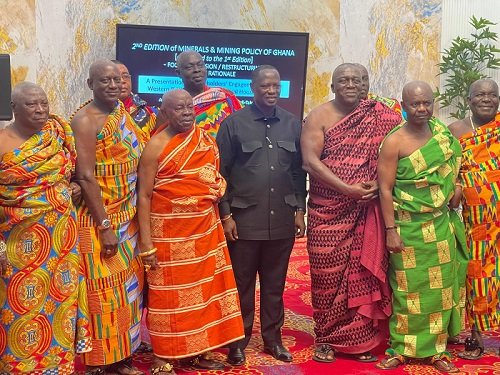The Minister of Lands and Natural Resources, Mr Emmanuel Armah-Kofi Buah, has described the state of poverty in the country as unconscionable given the exploitation of the vast and rich potentials from metals, including gold over the years."Why should Ghana be poor when we have exported over $5 billion worth of gold in the last five months?" he asked.Mr Buah raised this question during a session organised by the Minerals Commission under the auspices of the Ministry of Lands and Natural Resources, to solicit inputs from the Western and Western North Regional Houses of Chiefs, in the review and amendment of Ghana's Minerals and Mining Act, 2006 (Act 703).The engagement, held at Essipun here on Friday, also discussed the review of the 2014 Minerals and Mining Policy.He emphasised that even though Ghana was the largest gold producer in Africa and ranked sixth in the world, the country continued to struggle with poverty, suggesting that there were some fundamental issues which needed to be addressed.Mr Buah said the Minerals and Mining Act, 2006 (Act 703) had been in existence for over a decade, noting that changes within the sector over the years had necessitated the move to amend the law.He stated that new technologies, climate change, transition minerals, new mining practices and experiences, emerging global trends, including challenges of the current Act, required the mining regulations to be examined to meet contemporary standards."There must be a complete overhaul of the structures of the law and policy- and also in terms of changes in technology, international laws, and even the way we have done things over the past decade…But most importantly, the role of the chiefs and traditional authorities must change in the way we extract resources to ensure that chiefs are the custodians of lands," he stated.The President of the National House of Chiefs and also Omanhene of Sefwi Anhwiaso, Ogyeahohoo Yaw Gyebi II, commended the Ministry for involving traditional authorities in reforming the minerals and mining legal regime.He said: "When you go through the Act and indeed all the regulations, nananom are not involved, so I am happy that this time round, nananom have been regarded for their comments."On his part, the Omanhen of Essikado Traditional Area and President of the Western Regional House of Chiefs, Nana Kobina Nketsia V, said it was time for the country to nationalise its mineral resources.He argued that the engagement was crucial in bringing a change to the minerals and mining legal regime for the benefit of the citizenry. FROM: CLEMENT ADZEI BOYE, ESSIPUN
Levels of poverty among Ghanaians unconscionable - Armah-Kofi Buah - Ghanaian Times
Published:
1 month ago
Source:
Ghanaian Times

